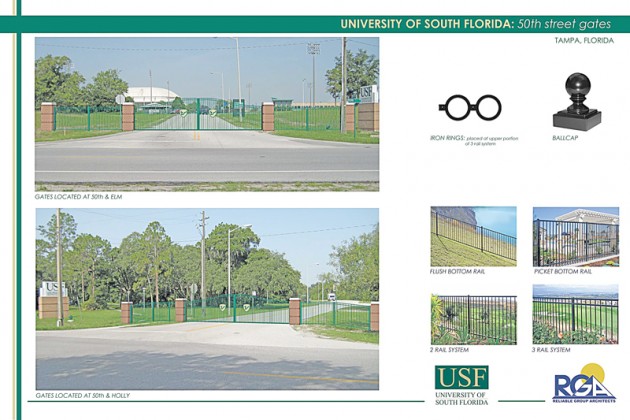Genshaft delays putting gates on campus

The University’s plan to build gates that would block off some campus entrances has been postponed indefinitely because of appearance, security and cost.
In April, Assistant Vice President of Public Safety Bruce Benson announced the idea for the gates. The original plan was to put up gates at six of the campus’ entrances, he said, and was to be completed before the start of the fall semester.
Only two gates will be installed, however. The gates will be located at the 50th and Elm and 50th and Holly entrances.
Previous plans for the gates were unattractive, Benson said.
Additionally, the original proposal was not up to the standards of President Judy Genshaft, said Vice President of Communications Michael Hoad.
“The president is extremely concerned with aesthetics — that the look of USF is first class,” Hoad said. “She does not want gates that just look cheap.”
Genshaft has not seen the new plans for the gates yet, Hoad said. But he said he thinks they are better than the first proposal.
“She didn’t want it thrown together,” he said. “She’d rather we do it more slowly so that it would enhance the aesthetics of the campus instead of looking like backyard gates.”
Benson said what the University plans to do now is more in accordance with what Genshaft wants.
“Now we’re going to put something up, still without a huge expense, but something that’s attractive and that blends in with the campus,” he said. “Maybe some kind of brickwork involved and a little more ornate things like a USF symbol or seal.”
The cost of the gates is undetermined, and where the University will get the money to pay for the gates is not finalized.
Benson said he believes the University will pull unused construction money from previous projects to fund the gates.
“The state does give the University capital construction funds that include a certain amount of ‘just maintaining the campus’ kind of funds,” Hoad said. This money could be used to build the gates.
Once they are installed, the gates will be closed and locked at midnight every night and reopened at 6 a.m., Benson said.
Each gate will have a sign on it that states, “The gate is locked from midnight to 6 a.m. Please use the main north entrance or main south entrance to campus,” he said.
Regardless of affiliation with the University, no one will be allowed to enter the gates during these hours.
Since the gates will be locked and unattended, students will be unable to access campus from 50th Street.
“There’s no reason that everybody in (Greek village and the residence halls) can’t easily get out other ways or back on to campus,” Benson said. “I think that for University people, especially as soon as they see what’s going on and if they’re going to be out between midnight and six, that they’ll pick up real quickly that instead of going this way, they’ll go two blocks that way to get where they want to go.”
Cean Duckworth, a junior business management major and member of the Sigma Alpha Epsilon fraternity, said the gates should not be installed.
“I don’t like that they’re doing it because I actually use those entrances a lot to get into Greek village,” he said. “So it’s going to take up my time to try to get around and everything.”
While the gates may be a problem for students living on campus, off-campus students do not see a problem with them.
Ashley Aycock, a junior microbiology major who lives off campus, said she does not think that gating the 50th Street entrances will affect her. However, she said she thinks there will be many students opposed to having the gates up.
The goal of the gates is to restrict and reduce some of the non-University traffic flow, drunken driving and drug-related arrests, and theft, Benson said.
Duckworth said that the gates will not have any impact on reducing drunk driving on campus.
“I don’t think that it’s going to help at all because if someone is going to drink and drive, they’re going to get in either way,” he said. “They can go through the front entrance or another entrance. Blocking a couple entrances isn’t going to stop someone from getting in.”
Aycock said she thinks that gating the entrances may help make the campus safer.
After the gates have been in place for a while, the University will determine whether the gates reduced nighttime crime, Benson said. If so, the University will look at picking a third site, he said.
Benson said he hopes the gates will send a message to non-University people who come onto campus to commit crimes.
“There would be a message there: ‘This isn’t the place to do this,'” Benson said.





